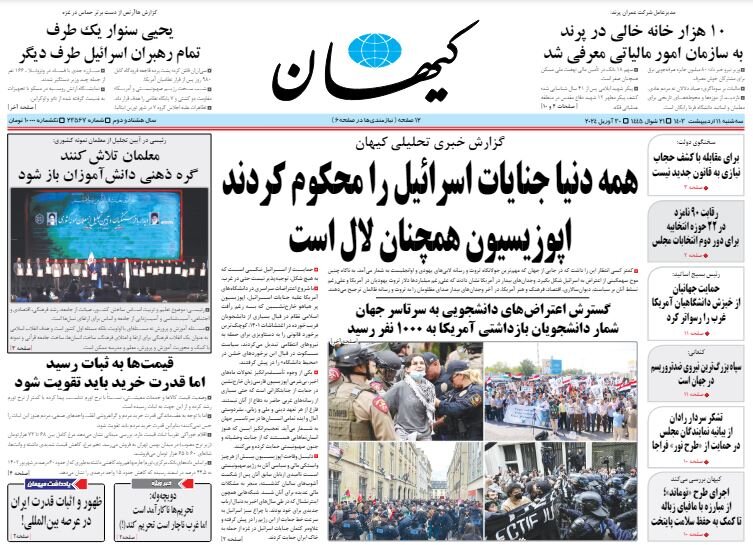TEHRAN PAPERS

TEHRAN - In a note, Kayhan dealt with the support of foreign opposition for Israel's crimes and wrote: One of the unfortunate aspects of the developments during the months that have passed since the war between Israel and Gaza is the insolence of the foreign opposition in supporting criminals that even many Western media do not want to defend them.
The heart of every human being has been hurt by the severity of Israel's crime in Gaza, and even many officials in the European Union and the United States have taken a stand against the madness of Netanyahu and Gallant and other leaders of this regime. But the anti-revolution opposition has brazenly supported Israel. It's enough of their stupidity that they did not recognize the Iranian nation well and from this support did not attract any profit and support from inside Iran. What is certain is that the reason for this insolence of the opposition is their financial and political dependence on the Zionist regime. The opposition has no sympathy for the country and the soil of Iran and demands sanctions and pressure on the people as well as a military attack on the country. Supporting Israel is a disgrace that cannot be justified in any way, even in the West.
Siasat-e-Rooz: The achievement should not be temporary
Siasat-e-Rooz wrote in its editorial: After the missile and drone response of the Islamic Republic of Iran to the criminal behavior of the Zionist regime, as well as the intensification of international support for Palestine and the resistance, which has reached American universities, some inside and outside the country once again raised the idea of reviving the JCPOA or negotiations with America. Supporters of this view believe that Iran is now at the peak of military and diplomatic power, and based on the principles of international relations, this is the right time to get concessions from the other parties who are facing a series of challenges. Considering the uncertainty of Biden's political future, what guarantee is there that Iran will negotiate with the United States, and after a few months, the story of withdrawing from the JCPOA will not be repeated? In a situation where the country's economy is growing, the approach to negotiations will be to return to the conditioning of the economy and even postpone the development of relations with many countries until after the result of these negotiations.
Etemad: Iran's nuclear case prospect
In a commentary, Etemad discussed the prospect of the nuclear case. The paper said: The important point in Iran's nuclear doctrine is that Tehran has dealt with this issue so far in such a way as to reduce the possibility of miscalculation. The most important confirmation of this is the statement of Rafael Grossi, Director General of the International Atomic Energy Agency, that the enrichment rate has been reduced by 60%. Moreover, although the United States has imposed sanctions against Tehran, it does not seem to impose sanctions that will raise the level of tensions. In general, with the escalation of tensions in the region, it seems that the negative consequences of America's withdrawal from the JCPOA have been highlighted more than before. The Israelis have now realized that America has other strategic priorities than trying to involve itself in another conflict in the region. Considering these issues, although now after the escalation of regional tensions and Iran's decisive response to Israel's actions, sensitivities towards Iran's nuclear program have increased, this issue itself can create conditions to manage tensions and interactions.
Shargh: There is no coalition against Iran in the region
In an interview with Mohammad Reza Mohammadi, a senior analyst of Middle East issues, Shargh investigated the rumor of an anti-Iranian Arab coalition. It wrote: The "True Promise" operation can be evaluated from different aspects, one of which can be considered the possibility of strengthening the Arab front to balance with Iran. As some believe, when Iran fired more than 300 missiles and drones at Israel in an unpredictable reaction to Israel's attack on its embassy in Damascus, a fundamental change in the balance of Arab countries between Tehran and Tel Aviv took place. Basically, the strategy of the countries of the region after the Al-Aqsa storm operation and the unprecedented and brutal massacre that Israel carried out in Gaza does not allow the balance of the West Asian Arab equations to be in favor of Israel and against Iran. On the other hand, it soon became clear that the role of the Arabs in repelling the Iranian attack was limited. Both Saudi Arabia and the UAE have frankly denied any direct military participation in defending Israel. Jordanian authorities have also stated that this participation was necessary to protect their interests. As a result, the issue of creating an anti-Iranian Arab coalition is not on the agenda.

No comments:
Post a Comment